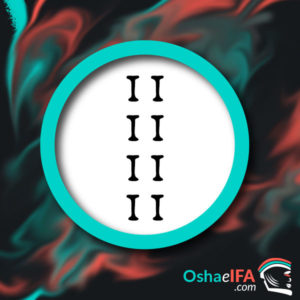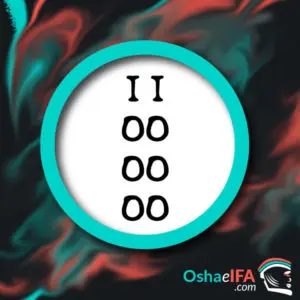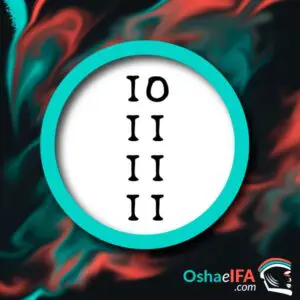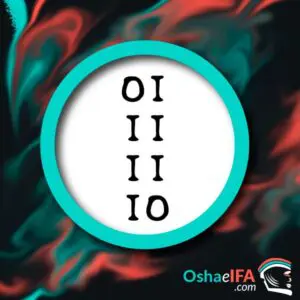Ogbe Di (8-7): Meaning, Analysis, Tips, Says Ifa and more

Ogbe Di, is Odu number 19 in the genealogical order of Ifá, it is essentially the sign in charge of waking up Orunmila every morning. This Odu highlights the importance of making sacrifices to the Orisha Shangó, who is key to attracting Ire and good fortune. Through this sign, we learn about the power of dedication and spiritual commitment in our lives.
Analysis and reflection by Ogbe Di
The Odu Ogbe Di is characterized by his deep connection with intelligence and cunning, essential for the successful management of business and interpersonal relationships.. Those influenced by this sign stand out for their ability to innovate and use their ingenuity in the face of economic challenges, which often leads them to prosperity. However, it is crucial to avoid the temptation of deception and dishonesty, as these practices can result in severe feuds and legal complications.
Ifá assures the followers of this sign that they will have the protection and support of powerful deities; In Ogbe Di, Oshun and Shangó play key roles, facilitating through their divine influence the achievement of positions and status desired by the person.
This Odu also addresses the theme of impersonation and opportunistic promotion in functions and positions. Although taking advantage of material and spiritual circumstances to surpass competitors can be beneficial, it also warns of the associated risks, such as the emergence of rivalries and resentments.
The knowledge is distributed.
Ogbe Di teaches us about the distribution of knowledge and the importance of finding and cultivating our area of expertise. Ifá reminds us that each person has a unique ability designed to differentiate them from others. Instead of dispersing our efforts by trying to cover multiple disciplines simultaneously, we should focus on perfecting those in which we naturally excel, as it is through this specialization that we will achieve recognition and success.
Religious aspect
Religiously, the Odu Ogbe Di demands a devout and constant commitment to spiritual practice. This sign emphasizes a deep connection with various divinities, including Shangó, Obatalá, Eshu, Oshun, Oggun, and Orunmila, each bringing their own specific influences and protections. Performing sacrifices and rituals is essential to honor these Orishas and to receive their protection and guidance. These ritual acts not only strengthen the practitioner's spiritual relationship with the divine, but also ensure support in times of adversity.
En particular, Ogbe Di highlights the importance of Obatalá, who in this Odu plays a crucial role in freeing his followers from the negative influence of Eshu on the mind.. The sacrifice of a goat to Eshu Odara is highly recommended to remove any obstacles that this deity may put in the practitioner's path.
For men who receive this Odu in Ifá divination, a complete consecration in Ifá is advised, since their destiny is marked to become babalawos. Women ruled by Ogbe Odi must consecrate themselves to Osha, and, no matter who their guardian angel is, they must pay tribute to Oshun.
Furthermore, the importance of offering Adie Meyi to the river annually as a tribute is emphasized. This practice is considered essential to ensure a prosperous year free of negative influences. These rituals and sacrifices reflect the essence of religious life in Ogbe Di, marked by respect and veneration for the Orishas who guide and protect their devotees.
Economic Aspects
In the economic sphere, the Odu Ogbe Di emphasizes the importance of caution and adequate preparation to avoid financial adversities. Ifá strongly recommends the performance of the sacrifices prescribed by Orunmila, as an effective means of protecting material assets against loss, theft or damage. This sign warns of the frustration and difficulties that arise when losing hard-won objects or property, and suggests that making offerings to Shango and the earth is crucial to ensuring stability and economic growth.
Furthermore, Ifá advises in Ogbe Di to maintain financial independence, especially during periods of economic instability. It is crucial to avoid going into debt, particularly with banks or financial institutions, as payment obligations can lead to a cycle of stagnation that is difficult to escape. Debt not only financially ties a person to his or her past, preventing progress toward the future, but it can also expose him or her to humiliating or embarrassing situations from creditors.
This Odu emphasizes the need for prudent and autonomous financial management, and promotes practices that allow people governed by Ogbe Di to remain free of economic ties that limit their ability to advance and prosper.. The importance of self-management and the avoidance of financial commitments that may compromise personal and business freedom is emphasized.
Social aspects:
Ogbe Di is known for being one of the most complex Odun within the Ifá corpus, characterized by his tendency to generate continuous conflicts, often caused by vain attitudes or envy within the social environment. This sign reveals how enemies or false friends may try to hinder a person's progress. To counteract these adversities, it is recommended to make sacrifices and beg your head with snapper, which symbolically guarantees victory over opponents and protects against ill will.
Orunmila, a prominent fortune teller, was surrounded by enemies who, disguised as friends, secretly conspired to destroy him through ebbós, sacrifices and witchcraft rituals. Faced with this threat, Orunmila decided to seek the guidance of Ifá, commissioning three of his students to consult the oracle on his behalf.
The Odu revealed was Ogbe Di, and Ifá predicted that his enemies would never have power over him and that he would emerge unscathed from all the traps laid in his path. Orunmila was recommended to make a specific sacrifice: offer a goat to Eshu, accompanied by rope and lobsters. After complying with these instructions, Orunmila's enemies were unable to cause him harm, thus confirming the effectiveness of following Ifá's guidelines.
Ifá ensures that any plan conceived against the person ruled by this Odu will not manifest and those who try to perpetrate evil will be identified and sanctioned by spiritual forces. This vision reinforces the importance of vigilance and spiritual intervention in protecting against injustice and malicious attacks in the social sphere.
Ogbe Di in Love
Ogbe Di demands caution and sincerity in romantic relationships, emphasizing the importance of avoiding manipulation and conflicts caused by misunderstandings or selfish interests. This Odu highlights that honesty and mutual respect are essential to building stable and long-lasting emotional bonds. Specifically, he advises women linked to this sign to maintain a close connection with a Babalawo, which can be seen as seeking spiritual guidance and emotional balance through respected and knowledgeable figures.
When a man consults Ifá and reveals himself to be Ogbe Di, it is crucial to evaluate the state of his current relationships. This Odu suggests an inquiry into new relationships, warning that the current partner may not be suitable. Despite physical attraction, there may be astral incompatibility that is likely to lead to conflict and misfortune. If the relationship is already stable, a detailed and honest analysis is recommended, consulting Ifá about the convenience of continuing or the need to make sacrifices to strengthen the bond.
Women to whom this Odu is revealed are urged to make adjustments in their behavior to foster a lasting relationship. Understanding that establishing a firm loving bond requires commitment and avoiding attitudes that can generate internal discord is crucial. Self-reflection and adaptation are keys to success in romantic relationships.
Ogbe Di is an Odu marked by infidelity and misunderstandings, where affected people tend to get involved in relationships more out of physical attraction than emotional or intellectual compatibility. This superficial approach can lead to unsatisfying and unbalanced unions, emphasizing the need for a deeper and more considered approach in seeking romantic partners.
Health:
In health matters, Ogbe Di warns about the dangers of stress and betrayal, which can manifest in physical problems such as impotence and tension-related ailments. The recommendation to avoid alcohol and coffee is in line with the need to maintain a balance and avoid alterations that could negatively affect his physical and mental well-being.
General Description of the Odu Ogbè Òdí
What is born in the Odu Ogbe Di?
- The blinking of the eye.
- The bad desires, both of the peers towards oneself and of one towards the similar ones.
- The Arayé (enemies).
- The hooks.
- The secret of guinea pepper.
- What you have to pay when you pick herbs.
- Camouflage.
What is Ogbe Di talking about?
- You have to put a roasted jutía (Ekú) on Obatalá as a defense.
- Ogbe Di Kaka Ogbe Di Lele tells us that the soul of each individual kneels in front of Olodumare in Ara Onu, who shows us our destiny before descending to earth.
- That this is where Shango led Obatala.
- Obatalá, who is called Obalufon Dei, is an Obatalá who lifts the person up, but then remains like that until Ikú arrives.
- That when Awó sees this Ifá "Ogbe Di" to his godson or aleyo, he is not told everything, because he talks about everything.
- Good and evil are manifested in this Ifá sign.
- That the Awó Ogbe Di must be very responsible and dedicated to Orunmila and Olodumare so that all his things go well; He also tells us that inexperience is the worst enemy of the babalawos, children of this odu.
- That you should decorate the front of your house with branches, because camouflage is born here.
- That the Awó Ogbe Di is really smart, that's why he has many adversaries in his life due to his good luck, service and also capabilities.
- That the aleyo that this Odu Ogbè Òdí is seen has to become an Awó or santero.
- Of three Omologu (Mayomberos).
- Oshún Yumu and you have to do ebbo with her and give her attention.
- That to give Pinado to his godson he has to do many works so that he does not get lost.
Recommendations:
- So that the Awó of this Oddun does not remain impotent, he has to ofikale trupon with the obiní when she is menstruating.
- Ogbe Di's daughter must live with Babalawo.
- Do something to the spirit of your Iyá Tobí.
- For this ifá abó is given to Shango.
- You have to feed the earth and the wind.
- Beware of revenge.
- We have to give Eggun an abo.
- To solve a big problem, Ogbe Di must give a drum to the Jimaguas.
- Do not leave someone's guarantor or take other people's problems to solve it yourself because you surely lose.
Prohibitions:
- He does not drink coffee.
- No deposited water is taken.
- You should not tell others' flaws to their faces.
- You must take care of your things and not abandon them to take care of other people's things.
It may interest you: Oddun from Ifa Edibere
Ogbe Di Sayings:

- Completely clear. Ogbe closes.
- They pay just for sinners.
- The true way to know nothing is to learn everything at once.
- After offering the benefit they leave me hanging.
- The arrow has the virtue of not sounding.
- Wisdom is scattered over many heads, for there is no head that can hold it back.
- After the death of a love, another is born that we think is better.
- If the crab had a head, it would walk with destiny.
- Who perseveres wins.
«After the death of one love, another is born that we think is better» reflects hope and renewal after emotional pain. It suggests that love loss, although devastating, can open the way to new relationships that we perceive as superior, encouraging us not to despair but to remain open to change and new possibilities.
«After offering the benefit they leave me hanging» expresses disappointment at not receiving reciprocity after extending a favor or help. It highlights the importance of prudence in generosity, reminding us that we cannot always expect gratitude or reward from those we support.
Ifa says in the odu Ogbe Di

Ifá reveals in the Odu Ogbe Di that although you may feel completely lost, Oshun will be your salvation. It is crucial to feed your head spiritually and faithfully keep your word. This practice will ensure clarity and guidance in times of uncertainty.
When Ogbe Di appears in divination, the querent is warned to avoid risking his or her life unnecessarily, especially by doing favors that could be dangerous. Likewise, you are advised to refrain from extramarital affairs and from harboring or protecting visitors who could cause problems. It is recommended to offer a goat to Eshu to safeguard oneself from taking on other people's burdens and avoid adverse consequences.
This Odu also suggests that the person has slighted his guardian deity and must make an appropriate sacrifice to rectify this situation. Ifá indicates that the individual's prosperity is far from his homeland; Therefore, he will prosper abroad and eventually return with riches. It is recommended that you visit his hometown at least once a year and celebrate there once he has prospered.
The initiate is told to avoid undertaking fishing-related businesses and to refrain from consuming fish to prevent serious stomach problems, especially if he has had a history of stomach ailments in childhood.
When Ogbè Òdí manifests, it is revealed that the querent will have a last son who will not only prosper but will also be more powerful than his other children, as long as he makes sacrifices dedicated to the prosperity and well-being of this son. He is instructed to serve his head with 201 coconuts as part of the sacrifice necessary to ensure the fame and success of his offspring.
Tips from the Ogbe Di Sign
For those who receive the Ogbe Di sign in their divination, it is recommended to make the complete sacrifice, including offerings to the God of Thunder. Ifá reveals that such a person will be blessed with a daughter, who is destined to marry a fortune teller, underscoring the continuity of spiritual wisdom in the family.
Ifá advises us that, as we strive to achieve our goals, whether professional or personal, we must fully commit ourselves and make the necessary sacrifices to ensure that we do not return without having achieved what we desire.
Furthermore, when Ogbe Di Kaka appears in divination, a social challenge is signaled: the person may be mocked for their generosity towards others while struggling with their own problems. This serves as a reminder that the help we offer is not always understood or valued by others, but maintaining personal integrity is essential.
Ogbe Di Kaka Ogbe Di Lele
Offerings were made to Eshu to ensure his support, highlighting that Eshu and evil were not God's creations. Likewise, it is noted that Orisha-Nla was the last deity forged by God, which marked the eventual intervention of Eshu among the deities. To mitigate Eshu's intrigues, Ifá rituals were carried out, seeking to neutralize his disruptive influences.
Meaning of Odu Ogbe Di (8-7)
Ogbe Di in Osobo Iku:
Stay alert for traps that your enemies may set for you, as they could put your life at risk. This aspect of the Odu also marks the origin of the arayé, or declared enemies.
Ogbe Di in Osobo Arun:
This sign warns about the importance of taking care of sexual health and vitality. It is essential to abstain from consuming alcohol and coffee and perform an ebbo at the foot of Shango to strengthen the spirit and body.
Oddun of Ifá Ogbe Odi in Osobo Ofo:
In this aspect, it is indicated that women connected to this sign must live with a babalawo to ensure a harmonious life. This Odu tells how man allied himself with the ayapá to dominate Obatalá's horse, symbolizing the overcoming of great challenges.
Ogbe Di 8-7 in Osobo Eyo:
It describes a person with bad manners and inappropriate behavior. In this context, Orunmila organized a party to mitigate the cruelty of her adversaries and it is highlighted that Shango offers protection at no cost, recommending the sacrifice of a ram to honor him. Likewise, he warns about the possibility of being unjustly accused of a crime.
I will go Ariku:
This Odu grants the possibility of community leadership to those who make the appropriate sacrifices, promising that Olofi will reward those who comply with the prescribed rituals with high positions.
Ogbe Di 8-7 in Ire Ashegun Ota:
To triumph in conflicts, it is crucial to adhere to the Orishas Oshun and Shangó. The importance of making annual sacrifices to the river is emphasized to ensure Ire, or good fortune, thus reinforcing the link with spiritual forces and nature.
Prayer of the Odu Ogbe Di:
Ogbe Di Kaka Ogbe Di Lele Ogbe Di Asuse afefe yesterdayi ota eye iya lomi borotiti iya lamebere titi adifafun shenibue ba unlo egungun lanshe.
Prayer to Awaken Orunmila:
Ogbe di Kaka Ogbe Di Lele Adifoyoke Barabaniregun Adifafun Oshún, adifafun Ogún, Obiní Ogbe Sa yeyé Matero Afefe lo Salu Awolode Awolada lo Ikin.
Ifá verse:
Ogbe di pe-pere lo d-Ifa k-ori ti o kun-le ti o yan-wa ti el-enini ko je-ki o se e. Ifá ni on ri alaromo kan ti ko fe ki a se n-kan eni. Ifá ni on yio ba-ni according to alaromo na. O ni ki a rub-bo akiko-die meta ati egbata o le oko.
Meaning: “Ogbe ends very generously” was the fortune teller for the one whose destiny was in danger and his enemies were trying to prevent its realization. Ifá predicts victory over those who wish for failure and emphasizes the need for sacrifices to counteract this negativity.
Verse of Odu Ogbe Di:
Je mi-lo se m-bo lo d-Ifa f-ariwowo ti o ngb-ogun lo si in-iti nwon ni ko ni san-wo bo. Eiye-le meji, akiko meji, ati egbaji. Or blush. Lati igba-na ni ariwowo ki iti san-wo bi o ba na si oke fa ohun-k-ohun.
Meaning: "Gently I go, equally I return" was the fortune teller for him in battle, guaranteeing that he would not return without having achieved his objective. Since then, he is guaranteed success in his endeavors, provided the necessary sacrifices are made.
These verses and prayers of the Odu Ogbe Di encapsulate the essence of seeking and securing divine support through rituals and sacrifices, reflecting the deep connection between spiritual action and results in earthly life.
Ebbo (works) by Ogbe Di in Ifá:
Work to obtain the protective force of Orúnmila:
If the person is a farmer, they must offer a dove to the Ikines bush. If he is not a farmer, he must give a dove to his Ifá. This sacrifice seeks to strengthen the spiritual connection and protection provided by Orúnmila.
Ebbo to avoid carrying other people's problems:
It is recommended to offer a goat to Eshu. This sacrifice is essential to avoid negative influences and extraneous burdens that may personally affect the individual.
Work of odu Ogbe Di to have children and prosperity:
A goat must be sacrificed to Ifá, accompanied by a goat to Eshu, a chicken and an empty money sack. This ebbo is crucial for those who seek the blessing of offspring and improvement in their economic conditions.
Ebó of the Ogbè Òdí sign to avoid the relapse of an illness and poverty:
It is necessary to offer a goat to Ifá and another to Eshu, in addition to four doves to Osanyin. This set of offerings is designed to protect against recurring illnesses and counteract economic adversity, invoking health and financial stability.
These Ebbo works are vital spiritual practices within Ifá for those under the sign of Ogbè Òdí, providing specific means to address life challenges, protect against negative influences, and foster well-being and prosperity.
It may interest you: Ifa Baba Eyiogbe sign
Patakies (stories) of the Ogbe Di sign:
The Awakening of Orúnmila
Orúnmila had a secretary in charge of awakening him, Ogbe Sa, whose mission was to receive the coconut from the oracle. However, Ogbe Sa had accumulated so much knowledge that he no longer called Orúnmila, but simply touched him to wake him up.
One day, Yeyematero, the thinking mother and wife of Orúnmila, observed how Ogbe Sa touched Orúnmila and how he woke up feeling bad. Worried, she thought about finding another secretary. Just then, Oshún and Ogún arrived. Oshún, a close friend of Yeyematero, heard her concern. Yeyematero explained to him that Ogbe Sa was no longer suitable for the position and told him what had happened. Oshún suggested: "In my land there is an Awó called Ogbe Di, I will send him to you to see if he is useful to you."
Upon arriving in his land, Oshún told Ogbe Di: «I am going to send you so that you can become great. Your mission will be to wake up Orúnmila at six in the morning. He taught him the proper prayer and added: "When you arrive, I will be at the door with Ogun so that your words are true."
The next morning, Ogbe Di arrived and introduced himself to Yeyematero saying: "I have come to wake up Orúnmila." She let it go. He knelt and, without touching Orúnmila, woke him up with her words.
Orúnmila woke up and at that moment Oshún and Ogún arrived. Surprised by the young man's ability, Orúnmila exclaimed: "Iború, Iboya, Ibosheshe, who is that young man who knows so much?" Oshún responded: «he is the Awó Ogbe Di and he will replace Ogbe Sa. He will also be the owner of knowledge.
Since then, Ogbe Di is known as the owner of knowledge and wakes up Orúnmila every morning. In gratitude for the favor that Oshún did him, Ogbe Di offered Oshún two yellow chickens in the river and Ogún a chicken in the mountains, thus reaffirming his power in all Yoruba lands.
Explanation: This patakie illustrates the importance of respect for knowledge and wisdom in relationships. Ogbe Di, through his respectful and wise approach, not only gains recognition from Orúnmila but also secures her position and respect among her peers. He teaches that reciprocity and recognition of favors received are essential to maintaining and strengthening relationships and one's position within a community.
Se Guess Ifa for Eshu
When Eshu was a slave with Orúnmila, Orisha-Nla, Orisha-Oko and Ogún, a divination was performed on him. He was asked to make a sacrifice in order to pay off his debts, which included several shells, palm seeds, 9 doves and 18,000 cowries. Ifá medicine would be prepared so that he could pay his debts, but Eshu refused to make the sacrifice.
In those times, Eshu was a fisherman and every time he fished, the 400 deities envied his success, believing that he would soon accumulate enough money to get out of his financial situation. For this reason, they decided to send it to different places on the same day.
Orúnmila sent Eshu to Oke Misi for his jacket and tray. Later, she consulted the Ifá oracle and it was determined that Orúnmila should make a sacrifice with 6 rabbits, 6 doves and 12,000 cowries. The Ifá medicine was prepared and the 6 rabbits were tied inside a sack, warning Orúnmila to always carry it with him.
Orisha-Nla asked Eshu to go to Orange for his staff and a sack. Orisha-Oko sent him to Ode Irawo for a hoe and Ogún sent him to Ode Ire for his large machete. Quickly, Eshu cast and obtained all the requested items. However, while he was away, the deities stole all the fish from his trap.
Returning to find the deities dividing their fish, Eshu inquired about the origin of the fish. Some apologized and others didn't know what to say. Those who apologized waived the debts Eshu owed. Eshu suspected that the fish had been stolen, since in Ife it was customary that no one should steal.
Orúnmila assured that he had not stolen the fish. Eshu suggested that Orúnmila could have stolen the fish that was inside the bag he was holding, thinking that the fish's noses were sticking out of the bag. They took the matter to the Ife court. There, Orúnmila was asked to show the contents of the sack, revealing that it contained the 6 sacrificial rabbits, which led to Eshu being blamed.
Eshu apologized to Orúnmila and offered him his house, an offer that Orúnmila rejected. The elders of Ife asked Eshu his intentions, and he responded that he would continue serving Orúnmila as always. Finally, Eshu was handed over to Orúnmila, but when he arrived at her house, Orúnmila told him to settle outside her house. Since then, Eshu lives outside Orúnmila's house, sharing what Orúnmila eats inside her.
Explanation: This story highlights the importance of honesty and trust within a community. The dispute between Eshu and the other deities highlights how misunderstandings and unfounded accusations can erode relationships. However, reconciliation and the offer of forgiveness show that maintaining peace and harmony requires a commitment to the truth and responsibility for one's actions.
Ogbe Di Ifa Traditional Nigerian
OGBÈ ÒDÍ
Kólálù lawo abé ota
Ejò ló kó làngbà làngbà wo isà
A day fún Baáyànnì
Ti n lo sijùu sèlé
Wón ní ó rbo
Won níre fun un
Èèkejì è yes n be nílé
Ó sì n rubo Sílè dè é
Èèkejìi è làá pè ní Sàngó
Ngbà ti Baáyànnì dé
Owó po
Ó bá kó diè fun Sàngó
Sàngó bá so owó mó aso è
Ifá pé ki eléyìun or tojú èèyàn dáadáa
Ayé bá ye Baáyànnì
N ní wá n jó ní wá n yò
Ní n yin àwon Babaláwo
Àwon Babaláwo n yin Ifá
Ó ní béè làwon Babaláwo tòún wí
Kólálù lawo abé ota
Ejò ló kó làngbà làngbà wo isà
A day fún Baáyànnì ti n lo sijùu Sèlé
Wón ní ó saca káalè kó rubo
Kó lè baà múre dé
Dà mo sunkún mó o
Dàda mó sèjè mó or
Èrò Ìsèlé n bò lonà
Yóó fùún or lóókan or so mórí.
Ifá wants this person to be well. He has a relative who lives far from him; the person being consulted should pray for the one who is abroad. That person will return with good things for him. He must perform the sacrifice.
Kólálù lawo abé ota
The snake that runs fearfully towards the burrow
They made divination for Baáyànnì
When I was going to the forest of Sèlé
They advised him to make the sacrifice
For fortune and abundance to come to him
His compatriot meanwhile was at home
Making sacrifices and pending your arrival
His compatriot is the one we call Sàngó
At the arrival of the Baáyànnì
Money was too much
He gave a part to Sàngó
Sàngó tied some of them over his clothes
Ifá tells this person to take good care of his partner or friend
Life pleased Baáyànnì
He then praised his Babalawos
Their Babalawos praised Ifá
He said his Babaláwos had told the truth
Kólálù lawo abé ota
The snake that runs fearfully towards the burrow
They made divination for Baáyànnì
When I was going to the forest of Sèlé
They told him to take care of the land and make the sacrifice
Since he will return with a big fortune
Dàda don't cry again
Dàda don't cry again blood
The people of the forest Ìsèlé will be back soon
They will give you a cowrie to tie to your hair strands.
Eshu Frekete by Ogbe Di
Eshu Frekete belongs to the Arara tradition. Its base is prepared with a special mixture that includes yam powder and husk. The Ogbe Di sign is engraved on it, and a dove is offered to it. Among the ingredients it contains are: Osun naború, obi, kolá, obi motiguao, eru, dog head powder, girl's Egun powder, mountain earth, earth of the four corners, crab earth (Ilekán), seven sticks of Elegba, seven guinea peppers, seven peonies, and seven herbs of Elegba. Finally, it is decorated with 101 snails, thus completing its ritual preparation.






